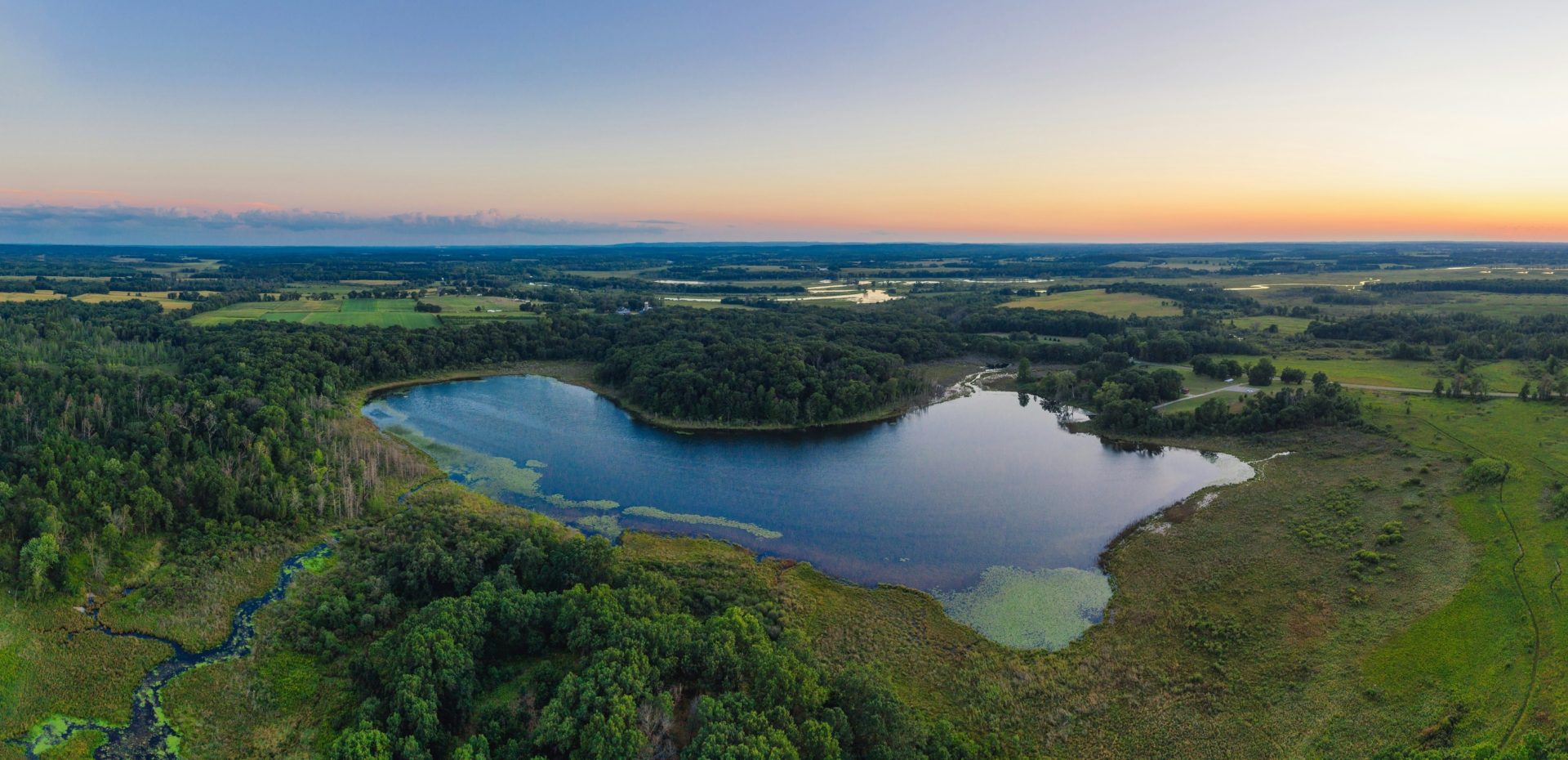Roots and Ripples: What the B Corp Movement Can Learn from Wisconsin
November 13, 2025
Ahead of Champions Retreat 2026, B Local Wisconsin’s Lisa Geason-Bauer reflects on collaboration, conservation, and the quiet power of the Midwest.
When Lisa Geason-Bauer talks about the B Corp movement in Wisconsin, she talks about place as much as purpose. The story of B Local Wisconsin, she’ll tell you, can’t be separated from the landscape that shaped it—its mix of farmland and factories, forests and freshwater, a culture of hard work and quiet generosity that runs as deep as the lakes that define the state.
“I’ve been Lady B for a long time,” she says with a grin. The title fits. As founder and president of Evolution Marketing, Lisa helped launch B Local Wisconsin in 2018—one of five original co-founders and the only one still serving on the board. “We started the conversations back in 2016, when there were maybe five Certified B Corps in the state,” she recalls. “By the time my company certified in 2018, we were the seventh. We built this community because we believed the movement needed a voice that reflected Wisconsin’s industries and values.”
The early years were scrappy and volunteer-run, typical of how things grow in the Midwest: collaboratively, patiently, and with a sense of shared stewardship. “All of the other co-founders took turns leading, and eventually it became my turn,” Lisa says. “I like to joke that I was voluntold to be president.”
B Local Wisconsin emerged alongside a broader shift toward sustainable business leadership across the region. Many of its earliest members were manufacturers and service firms rooted in small cities or rural towns—places where relationships stretch across decades and reputations matter more than trends. “That’s our little B Local community,” Lisa adds. “We grow slowly, but we grow with intention.”
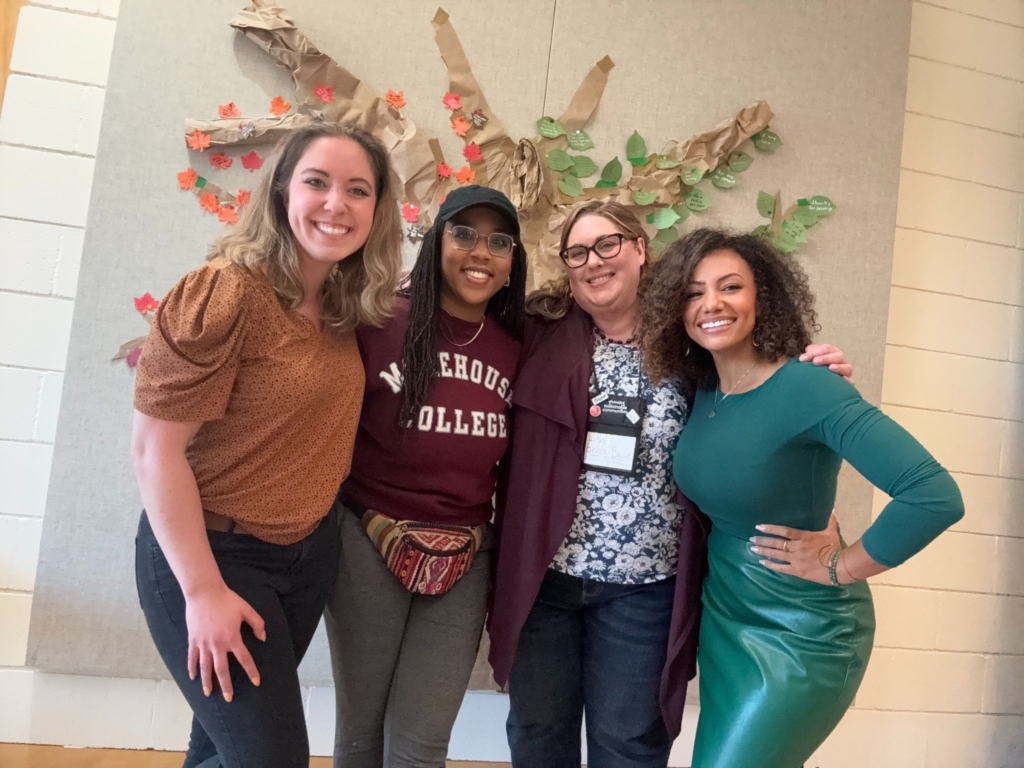
From left to right: Kim Mintrone (B Local Wisconsin Events Committee Chair), Alyssa Neff (B Local Wisconsin Marketing Committee Chair), Lisa (B Local Wisconsin Board President), August M Ball (B Local Wisconsin Liberatory Action Committee Chair) during the 2025 International Women’s Day Program
Patience, she believes, is a kind of strength. Working side-by-side in a small ecosystem means collaboration isn’t optional. In Wisconsin, growth happens through alignment and not acceleration—a shared sense of what matters and why. Today, the network includes about 27 Certified B Corps. “We’re still growing this movement,” Lisa says. “But if you’re doing something in Wisconsin, you’re not doing it because it’s trendy or hip. You’re doing it because it aligns with your community, your industry, and your values.”
For Lisa, place is the operating system beneath every decision. In a global movement that can feel abstract, she argues that context—the habits, histories, and politics that shape daily life—determines how impact actually happens. “Every community has its own way of doing this work,” she says. “In Wisconsin, collaboration isn’t an aspiration. It’s how things get done.”
Why the Midwest Matters Now
When B Lab U.S. & Canada announced that the next Champions Retreat, “Ripples to Waves,” would be held in Milwaukee in April 2026, Lisa was surrounded by raised eyebrows and wide smiles. At last week’s Sustainable Business Council conference—a gathering of companies from across Wisconsin and the upper Midwest—she could hardly make it down a hallway without hearing the same question: “Lisa, how did this happen?”
“People were shocked—in a good way,” she recalls. “Previous retreats have always been in large coastal cities, so bringing it to Milwaukee feels like a real moment of recognition. This is a mid-sized city with a very particular spirit: collaborative, grounded, and—because Wisconsin is a purple state—deeply practiced in meeting people where they are.”
The Champions Retreat is the largest annual gathering of Certified B Corporations in North America: part celebration, part strategy session, and part family reunion. It’s where business leaders, movement builders, and changemakers converge to share lessons, strengthen networks, and chart collective action for the years ahead.
For Lisa, the decision to host in Milwaukee is symbolic. “This is the right time for the movement to come here,” she maintains. “Wisconsin is a microcosm of the country. It’s politically mixed, geographically diverse, and defined by people who make things happen by working across differences. That’s the kind of collaboration the world needs right now.”
Her view is pragmatic as much as philosophical. “I live in one of the most Republican counties in the country, and I work in sustainability every day,” she says. “That means I have to build relationships with people who don’t always share my views. But it makes me a better businessperson. It forces me to listen and find common ground. The rest of the movement could benefit from that.”
Lisa knows this from experience. “I’m a sociologist by training,” she explains. “When I was in grad school at Michigan State, I interviewed farmers in rural Michigan who were part of the militia movement. A few even pulled guns on me, yelling that I was with the government. And I had to stand there and say, ‘No, I’m just a graduate student; I want to understand your farm practices.’” She pauses. “That experience shaped me. Here in the Midwest, you can’t write people off just because they think differently. You find common ground, or else nothing moves forward.”
Coalition-building runs deep in Wisconsin’s culture. “We collaborate with Republican and Democratic leaders, with nonprofits, with local government, with farmers and business associations,” Lisa explains. “We don’t have the luxury of staying in our corners.” In Wisconsin, cooperation is a muscle memory. Progress depends more on conversation than on consensus, and collaboration has become a learned reflex over generations.
It’s an approach that can make things move more slowly, but Lisa sees that as an advantage. “On the coasts, I hear people say, ‘We did this, we did that.’ And that’s great. But I can’t move that fast. I work with people who see the world differently than I do. We have to build coalitions if we want anything to happen. That’s what makes Milwaukee, and Wisconsin more broadly, unique.”
Partnerships also stretch across state lines. B Local Wisconsin often teams up with its Illinois and Michigan neighbors to share ideas, compare notes, and support each other’s events. “The whole upper Midwest operates this way,” Lisa says. “We have to be strategic and make the business case for what we do, but community always comes first.”
She pauses, thoughtful. “That’s what I hope people feel when they come to Milwaukee. Not that we do things better or differently, but that we’ve learned to do them together. That’s the quiet power of this place.”
The Origins of Wisconsin’s Conservation Ethic
Wisconsin’s sustainability story stretches back more than a century. “Most people don’t realize that the roots of modern environmental policy were planted here,” Lisa says. “Our former governor, Gaylord Nelson, founded Earth Day in 1970. The University of Wisconsin led agricultural research that shaped national food systems. Conservation is in our DNA.”
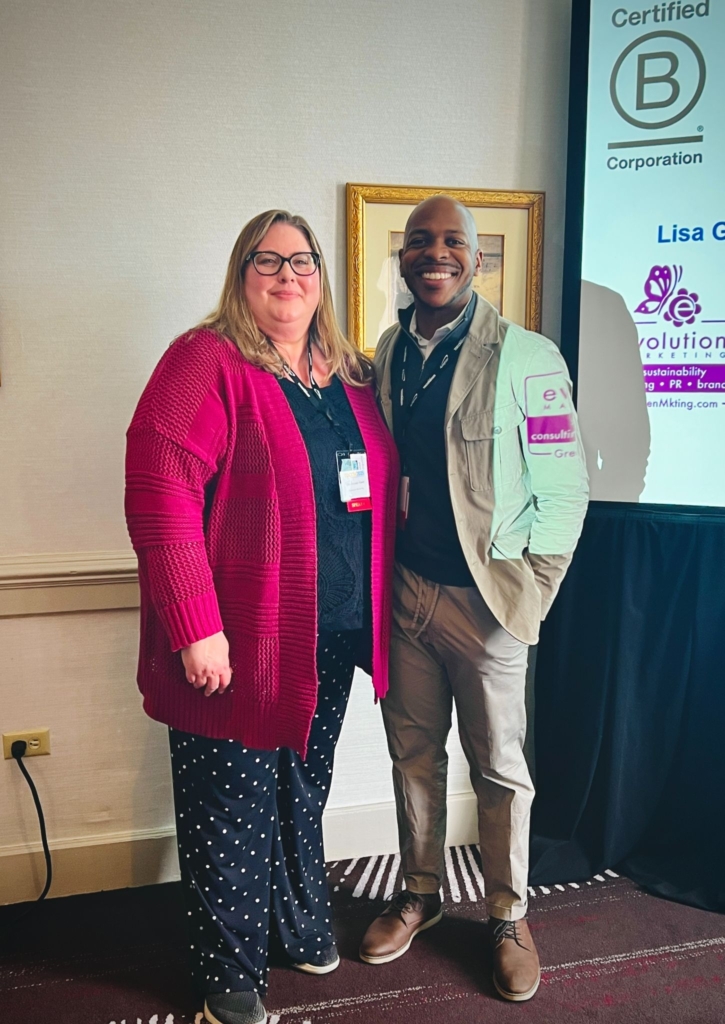
Lisa and Darrie Matthew Burrage (Former VP of the B Local WI Board) presenting at the 2025 WI Talent Development Conference to discuss how B Corps operate differently, along with examples from the community.
The legacy runs deep. In the late 1800s and early 1900s, Wisconsin’s progressive movements wove together social reform, labor rights, and environmental stewardship. The state established one of the nation’s first forestry commissions in 1867 and passed landmark conservation laws decades before such ideas reached the national stage. “Our leaders back then were what we might now call social democrats,” Lisa explains. “They believed healthy communities depend on healthy ecosystems. Those ideas didn’t start on the coasts; they began here, in the Midwest.”
Conservation in Wisconsin is both bipartisan and personal. “You don’t have to call yourself an environmentalist to care about clean water or healthy soil,” she says. “Farmers, hunters, fishers, families—we all depend on the land.” She laughs. “I grew up on a dairy farm. I still live in the country. There are wild turkeys in my yard, and the occasional coyote wanders a little too close. You can’t live here without feeling connected to nature.”
Her own county—among the most conservative in the country—has long produced leaders committed to preservation. “Our former county executive, Dan Vrakas, a Republican who took part in the first Earth Day as a college student in 1970, is still a huge environmental advocate,” she says. “Protecting land and water isn’t partisan here. It’s cultural.”
Even the landscape reminds residents of that continuity. Wisconsin is a state of lakes—over 15,000 of them—and names like Oconomowoc, Nashotah, and Nagawicka still carry the language of the Potawatomi and other Indigenous nations who first cared for this land. “Growing up, we were taught what those names meant,” Lisa says. “Oconomowoc means ‘the land between two lakes.’ That awareness that the land was here before us, and will be here after us, shapes who we are.”
Lisa doesn’t shy away from the harder truths. “Don’t get me wrong, there were plenty of injustices,” she says. “But in Wisconsin, Indigenous communities have remained part of the story. Their languages and teachings remind us that we share responsibility for this place.”
That sense of shared responsibility extends to Wisconsin’s agricultural innovation. The state is home to Organic Valley, the nation’s largest cooperative of organic farmers, and to the University of Wisconsin–Madison, one of the oldest and most influential agricultural universities in the country. “UW–Madison was the first place to pasteurize milk,” Lisa notes. “We’ve always been a farming state. Dairy, produce, sustainable agriculture—they’re all tied to community. Even in Milwaukee, you see urban farming projects like Fondy Food Center carrying that same spirit forward. Food, land, and environment are all interconnected here.”
It’s an interconnectedness that mirrors the B Corp ethos itself: interdependence, stewardship, and a recognition that doing good for people and planet are inseparable goals. “Maybe that’s why the movement feels so natural here,” Lisa reflects. “We were raised to see that everything’s connected, and to understand that what you take care of takes care of you.”
From Labor to Leadership: Wisconsin’s Culture of Action
Wisconsin’s B Corps inherit the same spirit that once powered its factories and farms: solidarity, resilience, and a bias toward doing.
Hardship has tested that instinct again and again. “The Great Recession didn’t officially end here until 2018,” Lisa recalls—a full decade after the national recovery began. “That long recovery taught us patience. It also reminded us that progress takes time, and that you don’t get anywhere alone.” The slow rebound reinforced Wisconsin’s tendency toward patience, pragmatism, and collective problem-solving. “Other states bounced back faster,” she says, “but we came out of it with a deeper sense of how much we rely on one another.”
That experience now shapes how Wisconsin’s B Corps operate. In a state still marked by political division and economic caution, local businesses understand that advocacy, policy, and community must move together. “Less than one percent of the population here are farmers now,” Lisa says. “But someone still has to speak for them. That’s why we send policy alerts to our B Local listserv whenever there’s a hearing or a chance to testify. We’ve written letters, signed national commitments like the COP30 Manifesto, and joined calls with groups like Ceres for Lead on Climate Day.”
The same ethic drives their partnerships. Wisconsin B Corps collaborate with organizations such as Clean Wisconsin, Renew Wisconsin, the Citizens Utility Board, and the League of Conservation Voters to influence energy policy, support clean water initiatives, and address utility rate hikes. “We take an active role,” Lisa explains. “Our goal is to help define what sustainable business means in Wisconsin, and to make sure those values show up in policy.”
Collective action extends to labor, too. “Unions have always been part of who we are,” Lisa says. “They represent dignity, stability, and the right of every person to support their family.” From breweries to construction sites, organizing is on the rise. Certified B Corps like Stone Creek Coffee and Lakefront Brewery—one of the 2026 Champions Retreat hosts—have both seen union drives in recent years. “Fairness and community are the backbone of Wisconsin values,” she adds.
That spirit of solidarity is reflected in the state’s changing leadership. A new generation is redefining progress, among them Milwaukee County Executive David Crowley, the state’s first Black county executive, and Milwaukee Mayor Cavalier Johnson, its first Black mayor. “Both are in their thirties,” Lisa notes. “They lead with transparency, values, and heart. They remind us what inclusive leadership can look like.”
Lisa also points to a wave of young legislators who identify as social democrats and emphasize cooperation over ideology. “Ryan Clancy, who spoke at one of our B Local events, is one of them,” she says. “There’s this next generation of leaders—Gen X, millennials, Gen Z—who are rebuilding systems to actually work for people. That’s the energy I see in Milwaukee.”
The city itself mirrors that renewal. Once defined by heavy industry, Milwaukee now thrives on culture, creativity, and connection. “In the summer, every weekend is a celebration: Irish Fest, German Fest, Asian Moon Fest, you name it,” Lisa says. “We’re a community that honors difference, that gathers to share what we love.”
For her, that convergence of enterprise, policy, and culture is precisely what makes Wisconsin the right place for the B Corp movement’s next chapter. “We’ve had our share of challenges—economic, social, political—but we don’t shy away from them,” she says. “We rebuild. We adapt. We do the work together. When people come to Milwaukee in 2026, I hope they’ll see a community that leads quietly but persistently, by showing up, side-by-side.”
Invitation to the Movement
As the 2026 Champions Retreat approaches, Lisa’s message to visitors is simple: come curious. “Let go of the Midwest clichés. We’re more than cows and cheese. We’re builders, bridge-makers, and problem-solvers. The best things happening here aren’t always visible from the outside; you have to look a little closer to see them.”
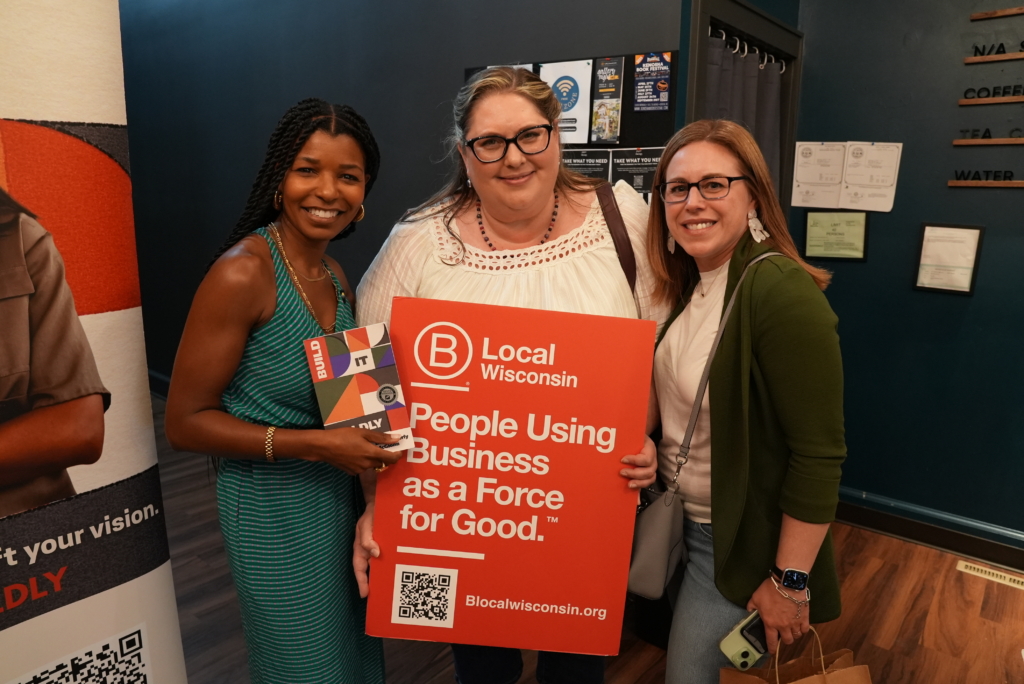
From left to right: Dr. Kimberly McGlonn (Founder & CEO of Build it Boldly and Grant BLVD), Lisa Geason-Bauer, and Erin Bauer (Communications Chair at B Local Wisconsin)
Wisconsin’s culture of action can make it easy to overlook what’s happening there. “We have a habit of waiting until something’s real before we talk about it,” Lisa explains. “We test ideas with our stakeholders, refine them, make sure they work, and only then do we share them. It’s a do-first, talk-later culture.” That quiet rigor means some of the most meaningful innovations never make headlines until they’re already embedded in daily life.
For Lisa, that restraint comes from integrity. “People sometimes say they do things because it’s the right thing to do,” she says. “For us, it’s deeper than that. It’s how we were raised; it’s built into who we are. Caring for the land, for community, and for one another is just how we make sense of the world.”
Visitors to Champions Retreat who linger, she says, will see that ethos in motion. Kayak the rivers. Visit the organic farms. Spend a morning in Milwaukee, then drive north toward La Crosse or the North Woods. “You can be surrounded by nature within minutes of the city,” she adds. “Eagles, cranes, wild turkeys… my backyard alone is a field guide.”
The advice extends beyond sightseeing. “Sometimes we want one solution to solve everything,” Lisa offers. “But what works in one community won’t always work in another. That’s the point of staying curious: to listen, to adapt, to understand where you are. That’s what I hope people feel when they come. Not flash, not noise. Just the calm of a place that moves at the pace of trust. That’s yet another lesson Wisconsin has to offer the movement.”
Looking Ahead to Milwaukee
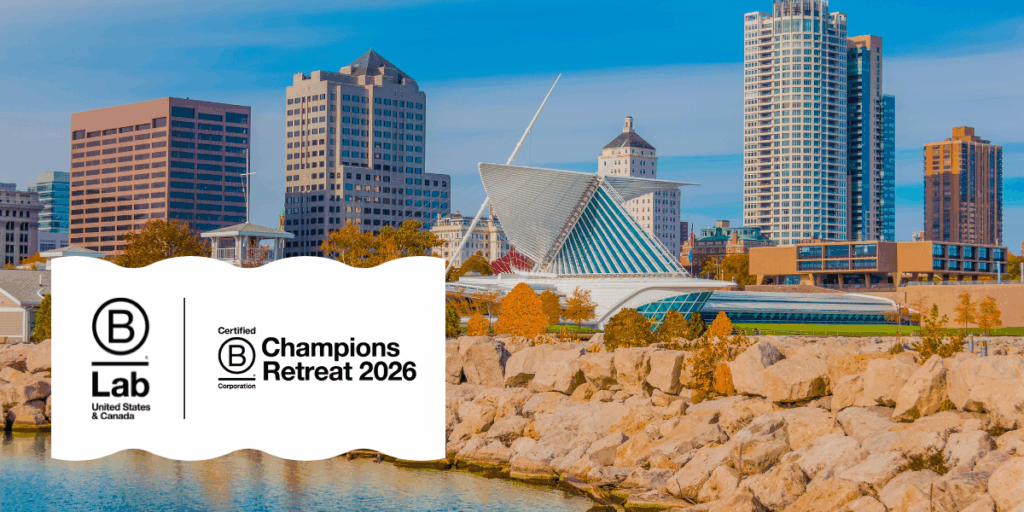
Wisconsin’s story begins in soil and water and continues in the steady work of collaboration. Here, change is cultivated through patience and shared care, not hurry or spectacle.
When the Champions Retreat arrives in Milwaukee in April 2026, it will meet a community that already lives the movement’s ideals. In that meeting, we will continue to grow what lasts together.
Header photo by Graydon Schwartz
Sign Up for our B The Change Newsletter
Read stories on the B Corp Movement and people using business as a force for good. The B The Change Newsletter is sent weekly.
